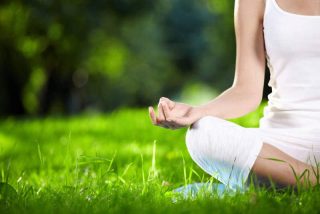Meditation is an ancient tradition that’s growing in popularity. Credit goes to the research and studies happening around the world. People are discovering the health benefits and experiencing the positivity in their lives.
Meditation is a process that helps you train your mind to focus on positive things and redirect your negative thoughts to positivity. In this article, we have discussed the 7 benefits of meditation backed by research and studies.

Photo by Andrea Piacquadio from Pexels
Study No. 1: Exercising More and Enjoying More
There was a study published in the Journal of Clinical Psychology found that athletes practicing meditation techniques (mindful yoga, as well as sitting meditation, and walking meditation) ended up more motivated to work out and more satisfied with their workouts when compared to those that didn’t practice mindfulness techniques.
The study involved 21 golfers and 11 archers, and they were put into a Mindful Sports Performance Enhancement program that ran for four weeks. This was done to see the effects of flow (the mental state where athletes are fully immersed in a feeling of energized focus, as well as enjoyment, and full involvement in their sport).
Those who took part reported that they were feeling less anxiety, thought disruption, pressure to achieve perfectionism, and had better flow, mindfulness, and confidence.
Study No. 2: Better Sleep
You most likely have had those nights when you get in bed feeling exhausted and ready to get sleep. But then you start having a lot of thoughts about your life or work as soon as you close your eyes.
Or maybe you have been having such nights frequently and suffering from insomnia. If you have this problem, give meditation a chance before you turn to pills. It’s a good idea to talk with your doctor about this problem first.
A study that appeared in JAMA Internal Medicine looked at 50 middle-aged men and older adults who had sleeping problems. Twenty-five of them went through a mindfulness program that taught them to focus on their current thoughts, experiences, and emotions. The remaining 25 did a sleep education class teaching ways of improving sleep habits. Both groups had two-hour sessions once a week six times.
The study found out the ones who completed the mindfulness program experienced less insomnia, depression, and fatigue. You can find out more about this program at the New York Meditation Center.
The good thing is you don’t have to go through the program to get these benefits. Set aside 20 minutes a day to practice mindfulness. The goal here is to create a reflex to more easily bring a sense of relaxation. When it is night, and you can sleep, you can easily evoke a relaxation response.
Study No. 3: More Game-Changing Ideas
According to research published in Frontiers in Cognition, meditation can improve your creative thinking.
Creativity that follows the flow of idea generation is known as divergent thinking. This is measured through the “Alternate Uses Task” method that involves participants being asked to think about the many possible uses of a given object, e.g., a pen.
The men and women taking part in the study participated in the “Open Monitoring” meditation (they are encouraged to be receptive to all sensation and thoughts without focusing on a particular object or concept) and “Focused Attention” meditation (they focus on a particular object or thought and nothing else).
The “Focused Attention” meditation did not have much impact. The “Open Monitoring” session resulted in the participants performing better in divergent thinking and also generated more ideas than before.
Study No. 4: Getting Sick Less Often
Moderate exercise and mindfulness meditation share one unlikely benefit: protecting against colds and flu. This is according to research published in the Annals of Family Medicine.
This study looked at 149 men and women who had an average age of 59. Some participants were given training sessions for eight weeks while something didn’t do anything. 51 of the participants went to the mindfulness meditation sessions, 47 were assigned moderate exercise (running or biking), while the remaining 51 were the control group.
The ones that went for the mindfulness sessions had 27 episodes of flu or cold symptoms. The group that exercised had 26 total episodes, while the control had 40. What is even better is when the groups doing meditation and exercise got sick, the symptoms were less severe, and they lasted for a shorter time compared to the control group. The meditation group saw a 40 to 50 percent drop in cold and flu symptoms. The exercise group saw a 30 to 40 percent drop in cold and flu symptoms.
Study No. 5: Reducing Chronic Pain
Meditation is a natural and effective alternative to painkillers when it comes to reducing chronic pain and the distress and depression associated with it. This is according to American Pain Society research.
A study published in The Journal of Pain involved 89 patients who had chronic neck pain and were randomly placed into exercise and meditation program groups for eight weeks. While both exercise and meditation helped in reducing pain during movement and improved quality of life, meditation was way better when it came to the ability to cope with discomfort and maximum pain relief.
Study No. 6: Reduced Risk Of Stroke, Heart Attack, And Death
The most researched form of meditation is known as Transcendental Meditation (TM). This method is very popular and has a celebrity following that includes Matt Bomer, Hugh Jackman, and Joe Manganiello. This method of meditation is going to involve getting trained by a teacher, but it is painless. It doesn’t take a lot of time, just 20 minutes twice a day. It is mantra-based, which means you just have to sit and close your eyes and repeat the mantra.
The benefits of TM
Since the benefits of Transcendental Meditation included their impact on health, researchers wanted to see if they could help in reducing the risk of heart disease. The American Heart Association did the research. The study had 201 participants and they were randomly assigned to take part in a TM stress-reducing program or a class about exercise and diet. Those in the TM group sat for 20 minutes with their eyes closed twice a day. They had to allow their bodies and minds to deeply rest as they remained alert and present. The health education group was advised to spend 20 minutes every day practicing healthy habits like eating healthy meals, exercising, and relaxing.
TM helped African Americans suffering from heart disease by reducing their risk of stroke, heart attack, and death. (Black adults have a 50 percent higher death rate from heart disease when compared to whites in the US, which is why the study focused on this population.) Even healthy participants saw lower blood pressure, anger, and stress when compared to the group that went for health education classes.
Study No. 7: Relieving Stress
Everyone likes to have less stress. The good thing is you can do it through brief mindfulness meditation practice, according to Carnegie Mellon University research.

They did a three-day experiment that involved two groups of 33 healthy men and women aged between 18 and 30. The first group meditated for 25 minutes every day; they were provided with breathing exercises so as to remain focused and present. The second group took a three-day cognitive training program that involved analyzing poetry to improve their problem-solving skills.
After three days, the participants completed math and speech tasks in front of evaluators. They reported that their stress levels and saliva samples were taken to note cortisol levels, which is the stress hormone. Those that took part in meditation sessions turned out to be more resilient when under stress.




![women [longevity live]](https://longevitylive.com/wp-content/uploads/2020/01/photo-of-women-walking-down-the-street-1116984-100x100.jpg)










